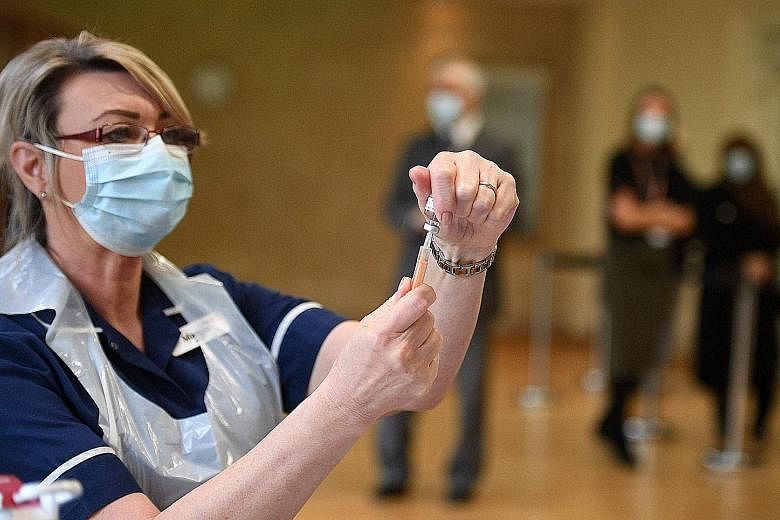LONDON • The first studies of Britain's mass vaccination showed strong evidence that Covid-19 vaccines were working as intended, offering among the clearest signs yet that the shots slash the rate of hospitalisation and may be reducing transmission of the virus.
A single dose of either the AstraZeneca vaccine or the one by Pfizer-BioNTech could avert most Covid-19-related hospitalisations, the British studies found, though researchers said it was too early to give precise estimates of the effect.
The findings on the AstraZeneca shot, the first to emerge outside of clinical trials, were the strongest signal yet of the effectiveness of a vaccine that much of the world is relying on to end the pandemic.
Separate studies of the Pfizer-BioNTech vaccine offered new evidence that a single shot may be reducing the spread of the virus, showing that it prevents both symptomatic and asymptomatic cases.
The findings, released on Monday, reinforced and went beyond studies out of Israel, which has also said the Pfizer-BioNTech vaccine offered significant protection from the virus in real-world settings.
No other large country is inoculating people as quickly as Britain, and it was the first country in the world to authorise and begin using both the Pfizer-BioNTech shot and the one developed by AstraZeneca and the University of Oxford.
The studies also showed that both vaccines were effective against the more infectious variant that has taken hold in Britain and spread around the world.
Still, the findings contained some cautionary signs. Government scientists warned that many more people needed to be injected to prevent cases from spreading into vulnerable, vaccinated groups and occasionally causing serious disease and death.
Britain has decided to delay giving people second doses of the Pfizer-BioNTech and AstraZeneca vaccines until up to three months after their first doses, opting to offer more people the partial protection of a single shot.
The trade-offs involved in that strategy were not entirely clear from the evidence released on Monday, but government scientists said the sharply reduced rates of hospitalisation justified the strategy.
But the findings also suggested that people became better protected from the coronavirus after a second dose. And they offered mixed answers to the question of how long the high protection levels from a single dose would last.
One of the new studies looked at about 19,000 health workers in England who had received the Pfizer-BioNTech vaccine. They were tested regularly for the virus, whether or not they showed symptoms, allowing the scientists to detect asymptomatic cases.
That study showed that a single dose of the Pfizer-BioNTech vaccine reduced the risk of becoming infected by about 70 per cent. After two doses of the vaccine, protection rose to 85 per cent, scientists said, though they cautioned that the low numbers of cases made it difficult to reach precise estimates.
Still, some vaccinated people were hospitalised or killed by the virus, a reminder that "protection is not complete", said Dr Mary Ramsay, head of immunisation at Public Health England.
A study conducted in Scotland encompassed both the Pfizer-BioNTech and AstraZeneca shots. The results on AstraZeneca's vaccine were more limited as it was authorised later in Britain, coming into use only early last month.
Researchers there examined about 8,000 coronavirus-related hospital admissions, and studied how the risk of hospitalisation differed among people who had and had not received a shot.
The numbers of vaccinated people who sought care in hospitals were so small, the researchers said, that they could produce only very rough estimates of the vaccines' effectiveness, and could not compare the shots with each other.
But from 28 to 34 days after the first shot, when it appeared to be at or near peak effectiveness, the AstraZeneca vaccine reduced the risk of Covid-19 hospital admissions by about 94 per cent. In that same period, the Pfizer-BioNTech vaccine cut the risk of hospitalisations by about 85 per cent, though in both cases, the numbers were too small for researchers to be confident of the exact effect.
The findings were a reassuring sign about the effectiveness of the AstraZeneca vaccine, which is the backbone of many nations' inoculation plans.
It is far cheaper to produce, and unlike the Pfizer-BioNTech vaccine - and one from Moderna, which is not yet in use in Britain - it can be shipped and stored in normal refrigerators.
NYTIMES

